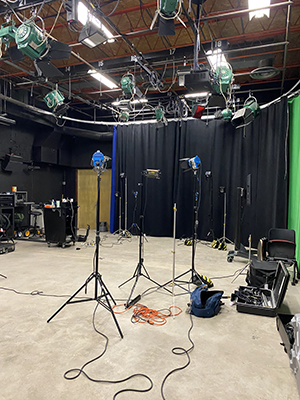MFJS Invests in New Tech for Students
MFJS students are used to our cozy building, set back on the farthest edge of campus. Built in the early ‘60s, the MFJS building is a little cramped and a little dated. But students have also come to know that, while our spaces may be less than ideal, the equipment available to them is not.
The MFJS faculty and staff have long believed that, as up and coming media professionals, our students deserve the best possible resources to succeed. “Unlike many schools where students must purchase their own gear, MFJS is proud to acquire gear on behalf of students, and offer them unrestricted access to the hardware and software tools to utilize throughout their enrollment at DU,” said Ethan Crawford, MFJS Tech Director.
We work each year with the College of Arts, Humanities and Social Sciences (CAHSS) to ensure that funding is available to support these goals. According to department chair Derigan Silver, Ph.D., “The College and the Department are investing so that students can learn on the latest technology – to support their learning at DU and their career preparation.”
We are excited to announce that this year the department was approved funding to purchase all new computers for our labs and editing spaces. Thanks to student lab fees, alumni gifts, CAHSS funding and an expertly managed MFJS operating budget, we will be retiring our iMac labs and replacing them with new Mac M1 Studio systems with Studio Displays.
We will also be adding new laptops and audio and video equipment to our filmmaking inventory. “We are now cycling out our oldest HD cameras, which are still amazing cameras, yet ‘HD’ is no longer the current trend in media production,” Crawford said. "We have already evolved past ‘HD’ and ‘QHD’, and now we are using ‘UHD’ 4k production equipment (and still preparing for the next generations of 6k, 8k and 12k production gear). In the past two years, we have acquired new 4k cinema cameras, mirrorless camera kits, gimbal cameras for mobile production, professional microphones and audio field recorders and grip/rigging kits."
Overall, MFJS invested $50,000 into new equipment this year out of our own budget and CAHSS invested an additional $64,000.
The MFJS department is committed to updating our computers every four years, so students can expect new machines in 2026. Video and audio equipment is updated as frequently as possible to allow students to work with the latest technology while building their skills and portfolios.
According to Crawford, “It's tricky to stay current in technology, because the hardware and software tools evolve on a weekly basis. In a general sense, we try to replace technology hardware on a 5-year cycle, but even that is just too slow for certain equipment, which needs to be updated on a 2-3 year cycle."
For example, cameras are not just lenses, mirrors and film, like the good old days. Cameras today are mini-computers with processors, proprietary software and vast arrays of configurable instrumentation. Cameras often come to market missing numerous core features, which are later released via software updates. The software or "firmware" that drives a camera requires regular maintenance and updates, similar to a laptop. Yet within a year or so, most cameras are replaced by a newer generation, and sadly, a lot of cutting-edge tools become obsolete only a couple years after their release.
“In education, there's also a durability issue with hardware. Most of our media production equipment is taken out into the field for film or newsgathering activities. Students take cameras up to the mountains, to sporting events, shows and social events. The gear endures regular use and abuse in adverse environments. So these delicate tools sometimes reach end-of-life earlier than planned.”
MFJS students continue have 24/7 card-access to the production studios and computer labs. They can check out a range of production equipment during business hours, and then spend a weekend shooting films within our sound stage studios on campus. Or students can book a podcast booth or professional edit system to create content around the clock.
The media industry is constantly changing and stretching the boundaries of innovation. We want our students to be ready for the next new developments without sacrificing the skills that will help them succeed today.



